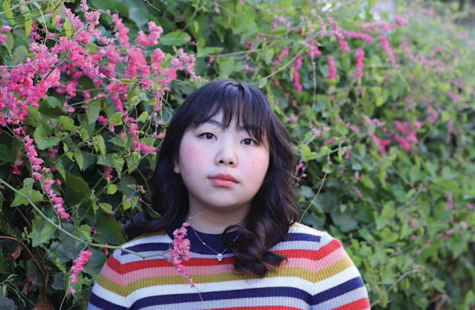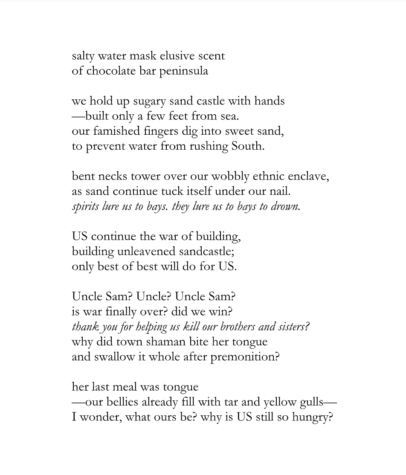Spotlight on Senior, Mina Choi, an Aspiring Writer
December 9, 2019
While many Marymount seniors nervously fill out college applications and work to relish their last year of high school, Mina Choi ‘20, Model United Nations 1st Deputy Secretary-General, pursues a vigorous writing career on the side. As a young poet beginning to gain notoriety and public exposure for her work, Choi has already achieved so much at such a young age. Choi’s interest in literature began when she was a child, and amongst her numerous awards, she was selected to represent Marymount High School at Archer’s 2019 Literature &… Conference. She is currently in the midst of writing a novel, and she has not even turned eighteen yet! Here, Mina Choi discusses her path to becoming a writer, showcases her latest piece of poetry, and provides a variety of excellent insights and tips for young writers about the multifaceted process of creating and editing poetry.

When did you decide that you wanted to be a writer? What attracted you to poetry?
As a child, before going to sleep every night, I would ask my mom to read me a book. In her broken English, she enthusiastically read each line, trying to compensate for her tongue that would not speak in the way she wished. I liked how the vowels would echo out of her mouth and into my ears. The soft lull of words captivated me, and thus began my love for literature.
Writing has always been a part of my daily routine: whether it be translating the household finances into the native language of my parents or forming stories in my free time, writing defines my reality. However, over time, my English-speaking skills sloped greater than Korean and communication with my parents became a chore that wore thin, but writing has given me comfort and continues to keep the memories and history of my identity alive.
Therefore, I continue to create.
What authors and/or literary works have inspired you, and why?
For quite some time, I did not read any literary works outside of school work. I was in the midst of writing a book, and I was too afraid to read the written works of other writers because I did not want to accidentally plagiarize and I wanted to be “original.” Now, I have learned that to be a great writer, you cannot lock yourself away from being inspired by others. It’s a great thing to be original but I was way too focused on that aspect of my writing than actually creating something that I truly resonated with. Therefore, in Junior year, I began reading more poetry outside of school. Li Young Lee, Hilda Doolittle, and E. E. Cummings are some of my favorite poets; they taught me to appreciate the small things you come across in life, and to see its beauty and significance.
What are your plans for writing in the future?
I never really thought that you could make a job out of writing, specifically creative writing. I know, it’s bad but that’s what I used to think. If you weren’t a New York Times Best Seller or a recipient of many highly acclaimed awards, then I thought that you were not even considered to be a writer. However, these preconceived notions of what I thought to be true quickly disappeared once I befriended other writers—some friends inside and outside of school. They gave me encouragement and structural criticism, which motivated me to see an actual career path in creative writing.
In the future, I hope to pursue screenwriting for TV shows (hopefully movies too, fingers crossed) and publishing a book, filled with memories and poetry that I hope to one day read to my mom in Korean.
What is your advice to other aspiring young writers?
- Don’t be afraid of critiques, and don’t take it too personally. Having an outside perspective is great because you could catch something you might have missed earlier on. It can also help gauge what your audience likes to read and if your writing is eliciting a positive or negative response.
- I encourage you to read. Read all sorts of genres and styles of writing, and don’t just simply judge something by what your friends think is considered good writing. I made the mistake of limiting what I read, which made me feel quite isolated as a writer. My advice to you is to keep your mind open and don’t be afraid to try something new!
Describe who has helped/influenced you to become the writer you are today.
There have been so many people who have influenced my writing. Parents, teachers, friends, little sisters, and even some kind strangers whose names I do not know. I would say that every poem I have written about a person has influenced my writing in some way. However, the most significant people who have influenced my writing have been my parents, friends, and Marymount teachers (you know who you are :)). They have helped me to grow as a writer and as a person through their words and encouragement. Often times, I find myself laughing aloud to myself in a quiet room filled with other people (& embarrassing myself), just thinking about a funny joke or moment I have shared with these people. Thank you for all that you have done for me and I just wanted to say that I am really happy and grateful to have met you all!
Do you showcase or publish your work anywhere?
I have a website for my creative writing, photography, and favorite quotes that is accessible to the public online, but I don’t really tell people about it that much. Currently, I’m writing a book of poetry and I’m almost done with it; I hope to publish it in the near future.
Below is “Sandcastle Proxy,” an original poem by Mina Choi ‘20.



